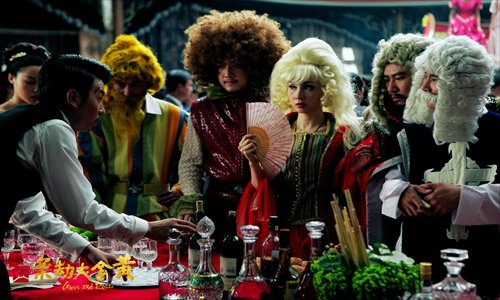Script guru returns to China



In a list of the most popular Chinese films in the world, Zhang Yimou's Hero would be among the group. But Zhang's fans, who hoped to see the big film win international acclaim, were disappointed in 2002 when both domestic and international film critics felt the big-budget production lacked a crucial element, namely a clear and moving story.
"This problem of creativity comes down to the fundamental fact that we can't tell a story very well," television scriptwriter Yu Fei told the Global Times.
For the second time, Cloudary, a publisher and cultural communication company based in Shanghai, invited famed scriptwriting instructor Robert McKee to put together a six-day training course in China, including a number of talks with Chinese directors such as Li Shaohong, whose works include Baober in Love, and Wu Ershan who is famous for his Painted Skin II as well as Lu Wei, the scriptwriter of To live and Farewell, My Concubine. Scriptwriter William M. Akers and film consultant Viki King also came to participate in the activities and advise on the pitches given by their trainees.
Last year, McKee's course focused on the skills and rules of storytelling, the core of his world-renowned book Story. This time, he went into further detail about different film genres and genre filmmaking.
Reality gap
Zhang Wei, the scriptwriter of The Story of LaLa's Promotion, said McKee's course was not closely related to the reality of China's filmmaking. The examples he usually referred to were not new for mature writers who have read his book and learned the rules about scriptwriting.
Bo Bangni, who wrote the latest television series of Dream of a Red Mansion and the script of Mulan, directed by Ma Chucheng, similarly feels that McKee's theories are difficult to apply to the situation in China.
"They cannot be directly connected," said Bo. She referred to the case of two popular Chinese films that McKee commented on, namely You Are the Apple of My Eye and Love is not Blind. McKee used these to explain that Chinese audiences seem to be more interested in emotions rather than a normal fully-rounded story.
Yu, who has attended both of McKee's courses, holds a different view. He said no theories could be used directly in practice but that it is important to learn the basic skills and fundamental techniques of scriptwriting. Talking about McKee's critiques of the two popular romantic comedies, Yu said one kind of film being popular does not mean audiences are only interested in this type of story. He believes that good stories have universal appeal.
Yu found that this year's training course was of more benefit to young scriptwriters than to experienced industry pros.
Overcoming differences
Besides some cultural differences on audience tastes and viewing habits, many discussions between McKee and domestic filmmakers came down to the search of a possible solution allowing Chinese films to be recognized and accepted by international audiences.
This year, McKee started a column for Southern Metropolis Daily and has reviewed four Chinese films, including Guns and Roses directed by Ning Hao and Seediq Bale directed by Taiwanese helmer Wei Te-Sheng. His major opinion on the breakthrough of Chinese films to the world is that they should focus on comedy, a genre that most people love. However, with the cultural differences in terms of wit, humor and sensitive topics, McKee suggests applying comedy stories to animated and fantasy films.
One of the issues puzzling domestic writers is whether the techniques used in more arthouse films and commercial films differ since it seem to be easier for an arthouse film to be acknowledged by international audiences and critics. McKee opined that there was no contradiction between art and popularity. He pointed to Farewell, My Concubine as an artistic film that has been extremely popular in the US and Europe at the time.
Future for Chinese films
On a forum Tuesday, McKee commented on a few hot topics for the Chinese filmmaking industry such as Sina Weibo discussions as to whether directors and writers should own a film's copyright. He also weighed in on an argument about the script of Wang Quanan's White Deer Plain. The film's producers and Lu Wei, who wrote seven script drafts for the film, have clashed as Lu was dissatisfied with the changes made by the director and finally asked for his name to be removed from the credits.
McKee pointed out at the forum that the future of the Chinese film industry relies on its film culture. One of the common problems is about who takes credit. Although many countries see directors or someone else take credit from the writer, it is important to clarify that everyone's rights are protected.
He criticized the phenomenon of director-centered production teams, where directors take control of the whole process. For McKee, to change the film culture in China, it is important to understand that writers are the most original content creators. Directing is more about interpretation. He believes that without such a complete and mature system to protect writers and their ideas, the film culture risks being destroyed.
Meanwhile, he said he feels production is also an art form, and that the combination between a weak producer and a strong director will not produce quality works. A common source of chaos in the industry is that the writer, director and producer is often the same person.
"I have no solution for how exactly these changes will take place in the next 10 years. But if your culture is going to produce work that the world will love, you need to manage to solve these profound problems of power, credit, money and creative vision," said McKee.